Critical Analysis of Self-Testing Effect on PSYC101 Exam Performance
VerifiedAdded on 2023/04/06
|7
|1432
|297
Essay
AI Summary
This essay critically analyzes the effectiveness of self-testing methods, specifically retrieval practice, for improving student performance on the PSYC101 final exam. It begins with an abstract summarizing the essay's focus on self-testing as a learning tool to enhance long-term memory retention. The introduction defines key concepts and outlines the essay's argument that self-testing is superior to conventional study methods. The body of the essay examines research from Ariel and Karpicke (2017), Rodriguez et al. (2018), and Tran, Rohrer, and Pashler (2015), exploring the impact of repeated retrieval practice and spacing techniques. Ariel and Karpicke's study supports retrieval practice's effectiveness, while Rodriguez et al. highlight the benefits of self-testing compared to traditional methods. Tran, Rohrer, and Pashler's research, however, suggests that retrieval practice may not always be effective in short-term scenarios, although it is useful in long-term. The essay concludes that the self-testing, repeated retrieval technique is a beneficial method for improving long-term memory retention, providing students with the knowledge to implement it in their study strategies for the PSYC101 final exam.
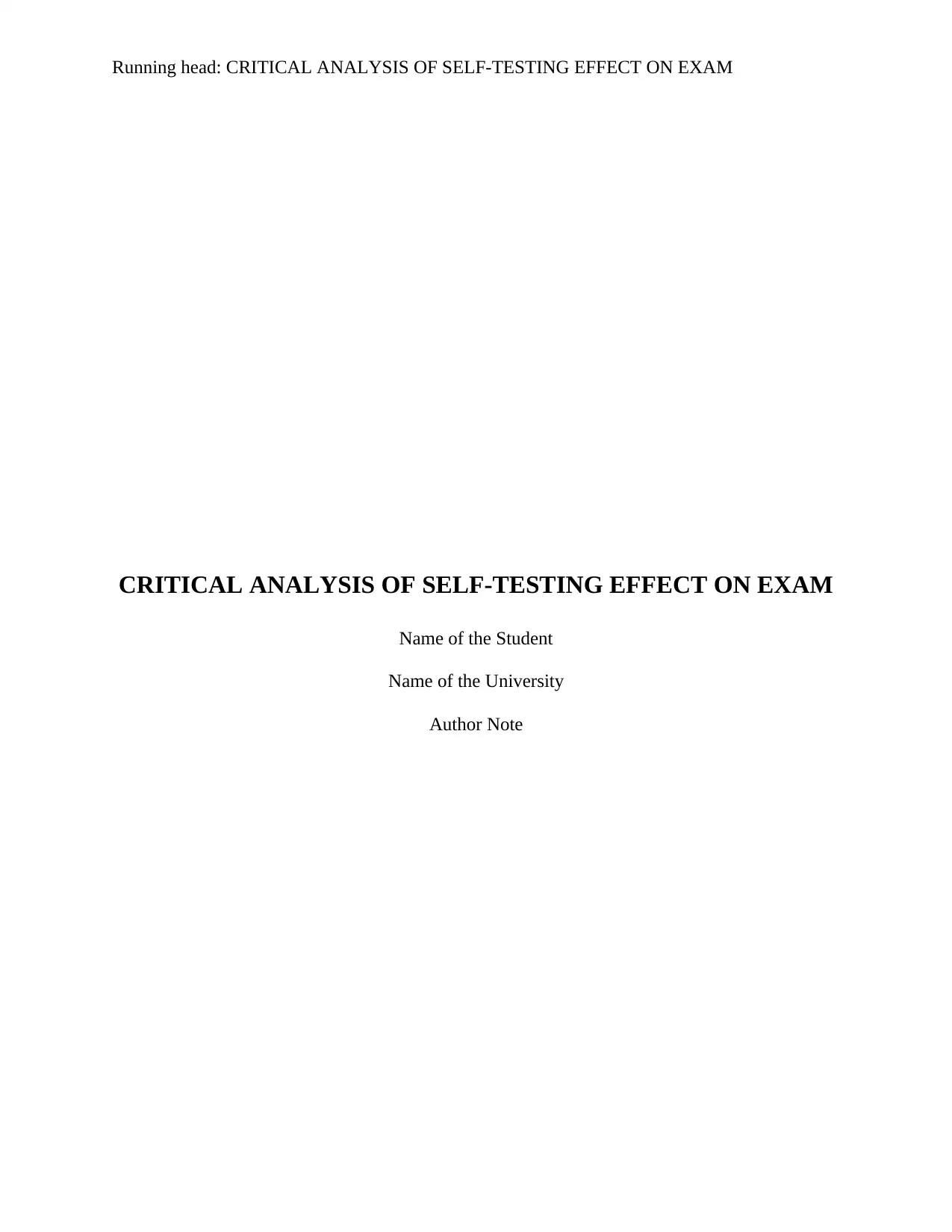
Running head: CRITICAL ANALYSIS OF SELF-TESTING EFFECT ON EXAM
CRITICAL ANALYSIS OF SELF-TESTING EFFECT ON EXAM
Name of the Student
Name of the University
Author Note
CRITICAL ANALYSIS OF SELF-TESTING EFFECT ON EXAM
Name of the Student
Name of the University
Author Note
Paraphrase This Document
Need a fresh take? Get an instant paraphrase of this document with our AI Paraphraser
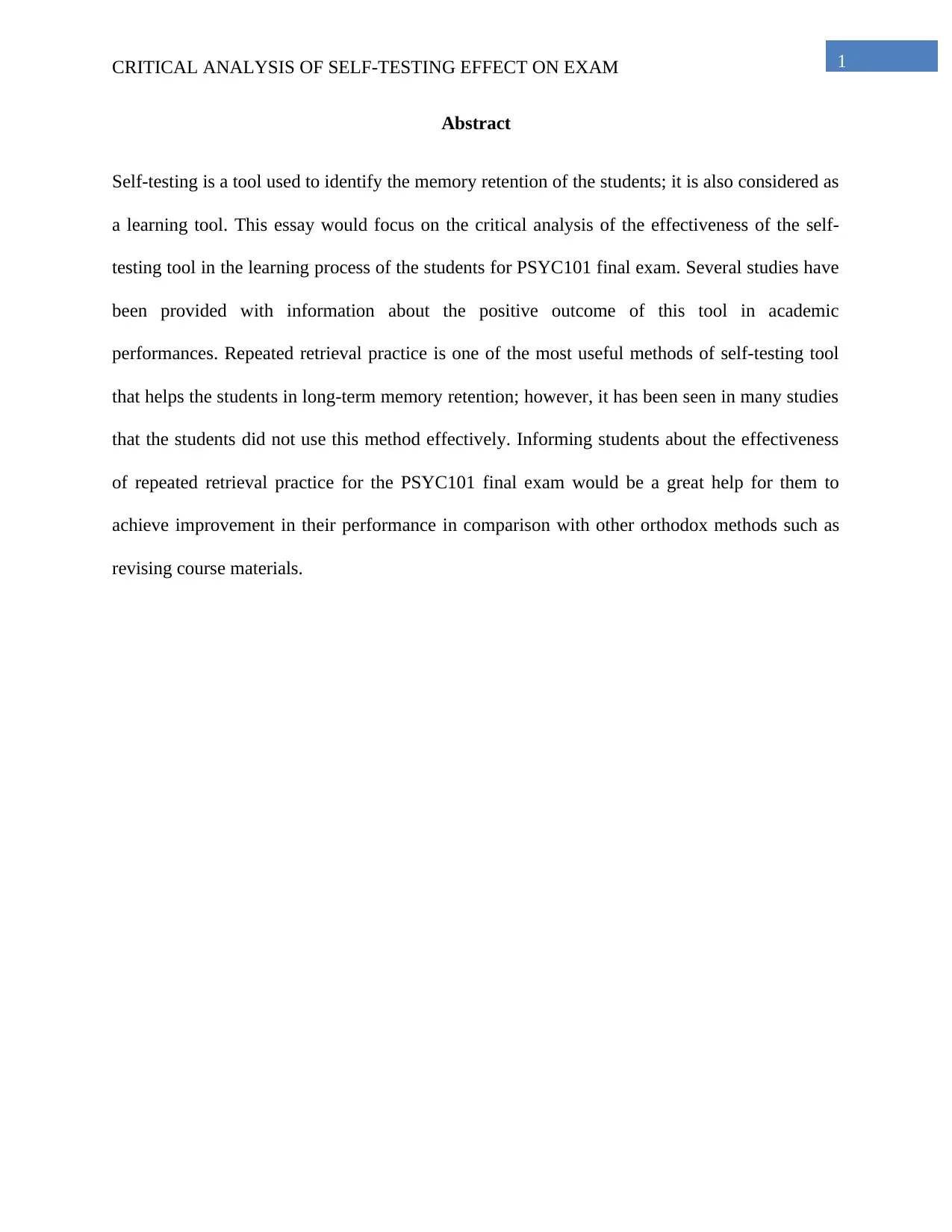
1CRITICAL ANALYSIS OF SELF-TESTING EFFECT ON EXAM
Abstract
Self-testing is a tool used to identify the memory retention of the students; it is also considered as
a learning tool. This essay would focus on the critical analysis of the effectiveness of the self-
testing tool in the learning process of the students for PSYC101 final exam. Several studies have
been provided with information about the positive outcome of this tool in academic
performances. Repeated retrieval practice is one of the most useful methods of self-testing tool
that helps the students in long-term memory retention; however, it has been seen in many studies
that the students did not use this method effectively. Informing students about the effectiveness
of repeated retrieval practice for the PSYC101 final exam would be a great help for them to
achieve improvement in their performance in comparison with other orthodox methods such as
revising course materials.
Abstract
Self-testing is a tool used to identify the memory retention of the students; it is also considered as
a learning tool. This essay would focus on the critical analysis of the effectiveness of the self-
testing tool in the learning process of the students for PSYC101 final exam. Several studies have
been provided with information about the positive outcome of this tool in academic
performances. Repeated retrieval practice is one of the most useful methods of self-testing tool
that helps the students in long-term memory retention; however, it has been seen in many studies
that the students did not use this method effectively. Informing students about the effectiveness
of repeated retrieval practice for the PSYC101 final exam would be a great help for them to
achieve improvement in their performance in comparison with other orthodox methods such as
revising course materials.
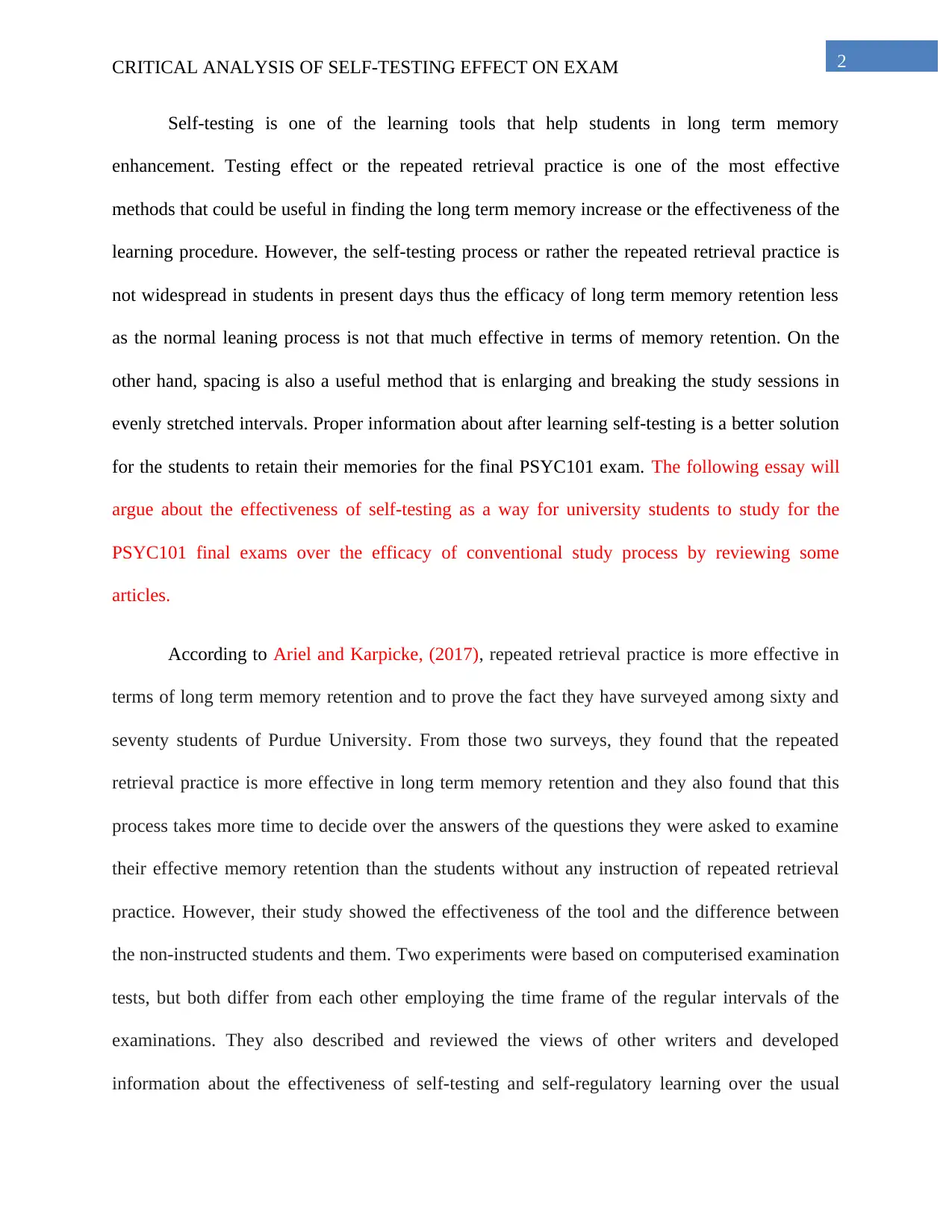
2CRITICAL ANALYSIS OF SELF-TESTING EFFECT ON EXAM
Self-testing is one of the learning tools that help students in long term memory
enhancement. Testing effect or the repeated retrieval practice is one of the most effective
methods that could be useful in finding the long term memory increase or the effectiveness of the
learning procedure. However, the self-testing process or rather the repeated retrieval practice is
not widespread in students in present days thus the efficacy of long term memory retention less
as the normal leaning process is not that much effective in terms of memory retention. On the
other hand, spacing is also a useful method that is enlarging and breaking the study sessions in
evenly stretched intervals. Proper information about after learning self-testing is a better solution
for the students to retain their memories for the final PSYC101 exam. The following essay will
argue about the effectiveness of self-testing as a way for university students to study for the
PSYC101 final exams over the efficacy of conventional study process by reviewing some
articles.
According to Ariel and Karpicke, (2017), repeated retrieval practice is more effective in
terms of long term memory retention and to prove the fact they have surveyed among sixty and
seventy students of Purdue University. From those two surveys, they found that the repeated
retrieval practice is more effective in long term memory retention and they also found that this
process takes more time to decide over the answers of the questions they were asked to examine
their effective memory retention than the students without any instruction of repeated retrieval
practice. However, their study showed the effectiveness of the tool and the difference between
the non-instructed students and them. Two experiments were based on computerised examination
tests, but both differ from each other employing the time frame of the regular intervals of the
examinations. They also described and reviewed the views of other writers and developed
information about the effectiveness of self-testing and self-regulatory learning over the usual
Self-testing is one of the learning tools that help students in long term memory
enhancement. Testing effect or the repeated retrieval practice is one of the most effective
methods that could be useful in finding the long term memory increase or the effectiveness of the
learning procedure. However, the self-testing process or rather the repeated retrieval practice is
not widespread in students in present days thus the efficacy of long term memory retention less
as the normal leaning process is not that much effective in terms of memory retention. On the
other hand, spacing is also a useful method that is enlarging and breaking the study sessions in
evenly stretched intervals. Proper information about after learning self-testing is a better solution
for the students to retain their memories for the final PSYC101 exam. The following essay will
argue about the effectiveness of self-testing as a way for university students to study for the
PSYC101 final exams over the efficacy of conventional study process by reviewing some
articles.
According to Ariel and Karpicke, (2017), repeated retrieval practice is more effective in
terms of long term memory retention and to prove the fact they have surveyed among sixty and
seventy students of Purdue University. From those two surveys, they found that the repeated
retrieval practice is more effective in long term memory retention and they also found that this
process takes more time to decide over the answers of the questions they were asked to examine
their effective memory retention than the students without any instruction of repeated retrieval
practice. However, their study showed the effectiveness of the tool and the difference between
the non-instructed students and them. Two experiments were based on computerised examination
tests, but both differ from each other employing the time frame of the regular intervals of the
examinations. They also described and reviewed the views of other writers and developed
information about the effectiveness of self-testing and self-regulatory learning over the usual
⊘ This is a preview!⊘
Do you want full access?
Subscribe today to unlock all pages.

Trusted by 1+ million students worldwide
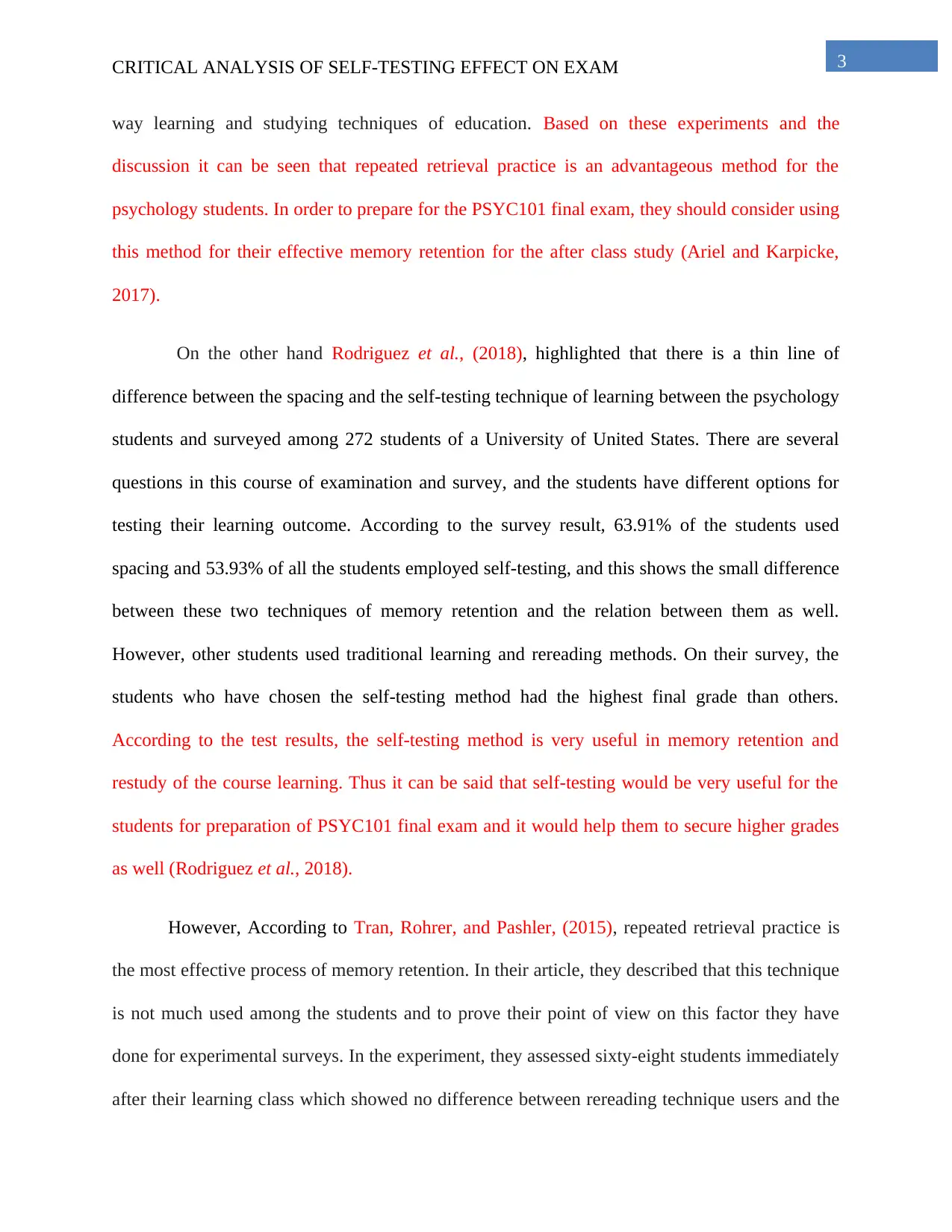
3CRITICAL ANALYSIS OF SELF-TESTING EFFECT ON EXAM
way learning and studying techniques of education. Based on these experiments and the
discussion it can be seen that repeated retrieval practice is an advantageous method for the
psychology students. In order to prepare for the PSYC101 final exam, they should consider using
this method for their effective memory retention for the after class study (Ariel and Karpicke,
2017).
On the other hand Rodriguez et al., (2018), highlighted that there is a thin line of
difference between the spacing and the self-testing technique of learning between the psychology
students and surveyed among 272 students of a University of United States. There are several
questions in this course of examination and survey, and the students have different options for
testing their learning outcome. According to the survey result, 63.91% of the students used
spacing and 53.93% of all the students employed self-testing, and this shows the small difference
between these two techniques of memory retention and the relation between them as well.
However, other students used traditional learning and rereading methods. On their survey, the
students who have chosen the self-testing method had the highest final grade than others.
According to the test results, the self-testing method is very useful in memory retention and
restudy of the course learning. Thus it can be said that self-testing would be very useful for the
students for preparation of PSYC101 final exam and it would help them to secure higher grades
as well (Rodriguez et al., 2018).
However, According to Tran, Rohrer, and Pashler, (2015), repeated retrieval practice is
the most effective process of memory retention. In their article, they described that this technique
is not much used among the students and to prove their point of view on this factor they have
done for experimental surveys. In the experiment, they assessed sixty-eight students immediately
after their learning class which showed no difference between rereading technique users and the
way learning and studying techniques of education. Based on these experiments and the
discussion it can be seen that repeated retrieval practice is an advantageous method for the
psychology students. In order to prepare for the PSYC101 final exam, they should consider using
this method for their effective memory retention for the after class study (Ariel and Karpicke,
2017).
On the other hand Rodriguez et al., (2018), highlighted that there is a thin line of
difference between the spacing and the self-testing technique of learning between the psychology
students and surveyed among 272 students of a University of United States. There are several
questions in this course of examination and survey, and the students have different options for
testing their learning outcome. According to the survey result, 63.91% of the students used
spacing and 53.93% of all the students employed self-testing, and this shows the small difference
between these two techniques of memory retention and the relation between them as well.
However, other students used traditional learning and rereading methods. On their survey, the
students who have chosen the self-testing method had the highest final grade than others.
According to the test results, the self-testing method is very useful in memory retention and
restudy of the course learning. Thus it can be said that self-testing would be very useful for the
students for preparation of PSYC101 final exam and it would help them to secure higher grades
as well (Rodriguez et al., 2018).
However, According to Tran, Rohrer, and Pashler, (2015), repeated retrieval practice is
the most effective process of memory retention. In their article, they described that this technique
is not much used among the students and to prove their point of view on this factor they have
done for experimental surveys. In the experiment, they assessed sixty-eight students immediately
after their learning class which showed no difference between rereading technique users and the
Paraphrase This Document
Need a fresh take? Get an instant paraphrase of this document with our AI Paraphraser
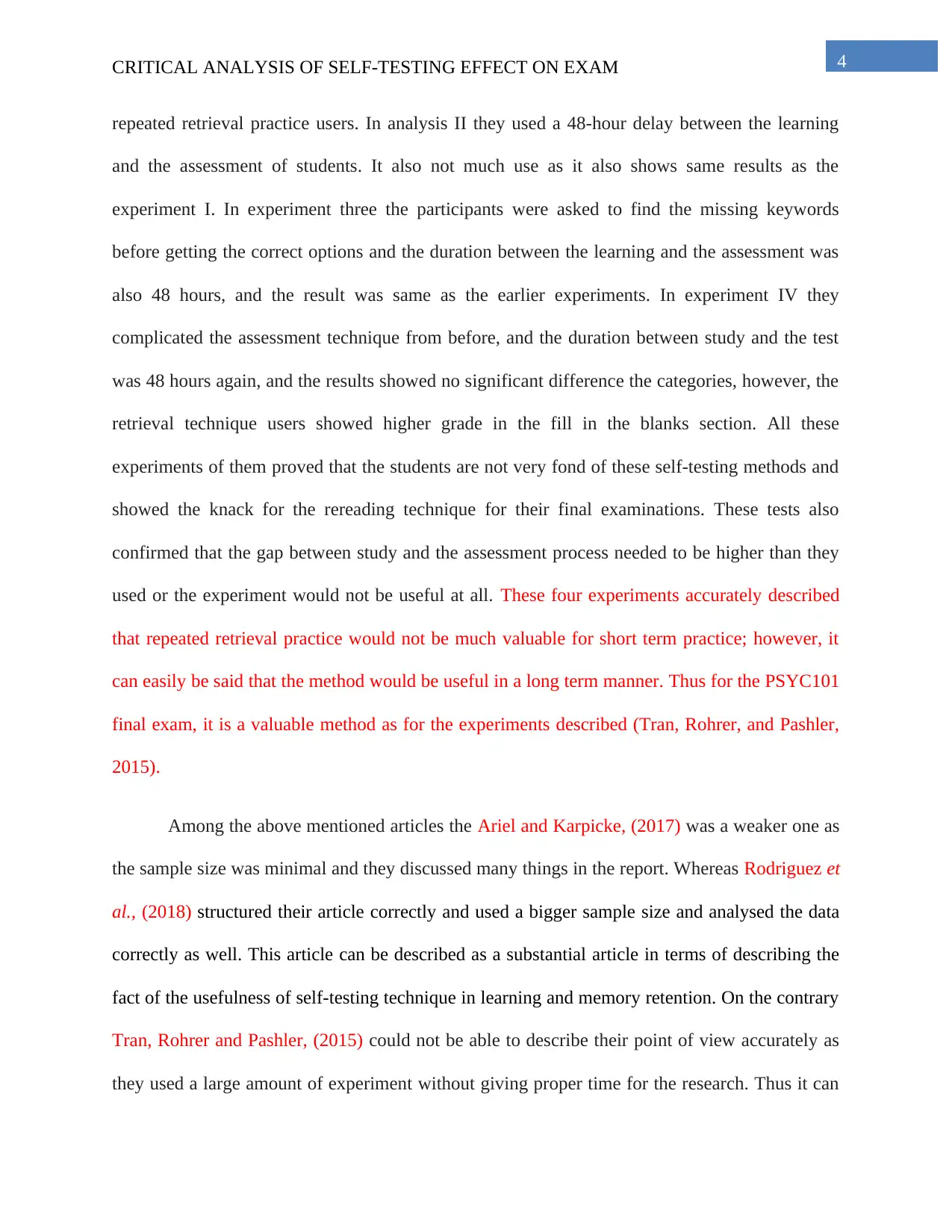
4CRITICAL ANALYSIS OF SELF-TESTING EFFECT ON EXAM
repeated retrieval practice users. In analysis II they used a 48-hour delay between the learning
and the assessment of students. It also not much use as it also shows same results as the
experiment I. In experiment three the participants were asked to find the missing keywords
before getting the correct options and the duration between the learning and the assessment was
also 48 hours, and the result was same as the earlier experiments. In experiment IV they
complicated the assessment technique from before, and the duration between study and the test
was 48 hours again, and the results showed no significant difference the categories, however, the
retrieval technique users showed higher grade in the fill in the blanks section. All these
experiments of them proved that the students are not very fond of these self-testing methods and
showed the knack for the rereading technique for their final examinations. These tests also
confirmed that the gap between study and the assessment process needed to be higher than they
used or the experiment would not be useful at all. These four experiments accurately described
that repeated retrieval practice would not be much valuable for short term practice; however, it
can easily be said that the method would be useful in a long term manner. Thus for the PSYC101
final exam, it is a valuable method as for the experiments described (Tran, Rohrer, and Pashler,
2015).
Among the above mentioned articles the Ariel and Karpicke, (2017) was a weaker one as
the sample size was minimal and they discussed many things in the report. Whereas Rodriguez et
al., (2018) structured their article correctly and used a bigger sample size and analysed the data
correctly as well. This article can be described as a substantial article in terms of describing the
fact of the usefulness of self-testing technique in learning and memory retention. On the contrary
Tran, Rohrer and Pashler, (2015) could not be able to describe their point of view accurately as
they used a large amount of experiment without giving proper time for the research. Thus it can
repeated retrieval practice users. In analysis II they used a 48-hour delay between the learning
and the assessment of students. It also not much use as it also shows same results as the
experiment I. In experiment three the participants were asked to find the missing keywords
before getting the correct options and the duration between the learning and the assessment was
also 48 hours, and the result was same as the earlier experiments. In experiment IV they
complicated the assessment technique from before, and the duration between study and the test
was 48 hours again, and the results showed no significant difference the categories, however, the
retrieval technique users showed higher grade in the fill in the blanks section. All these
experiments of them proved that the students are not very fond of these self-testing methods and
showed the knack for the rereading technique for their final examinations. These tests also
confirmed that the gap between study and the assessment process needed to be higher than they
used or the experiment would not be useful at all. These four experiments accurately described
that repeated retrieval practice would not be much valuable for short term practice; however, it
can easily be said that the method would be useful in a long term manner. Thus for the PSYC101
final exam, it is a valuable method as for the experiments described (Tran, Rohrer, and Pashler,
2015).
Among the above mentioned articles the Ariel and Karpicke, (2017) was a weaker one as
the sample size was minimal and they discussed many things in the report. Whereas Rodriguez et
al., (2018) structured their article correctly and used a bigger sample size and analysed the data
correctly as well. This article can be described as a substantial article in terms of describing the
fact of the usefulness of self-testing technique in learning and memory retention. On the contrary
Tran, Rohrer and Pashler, (2015) could not be able to describe their point of view accurately as
they used a large amount of experiment without giving proper time for the research. Thus it can
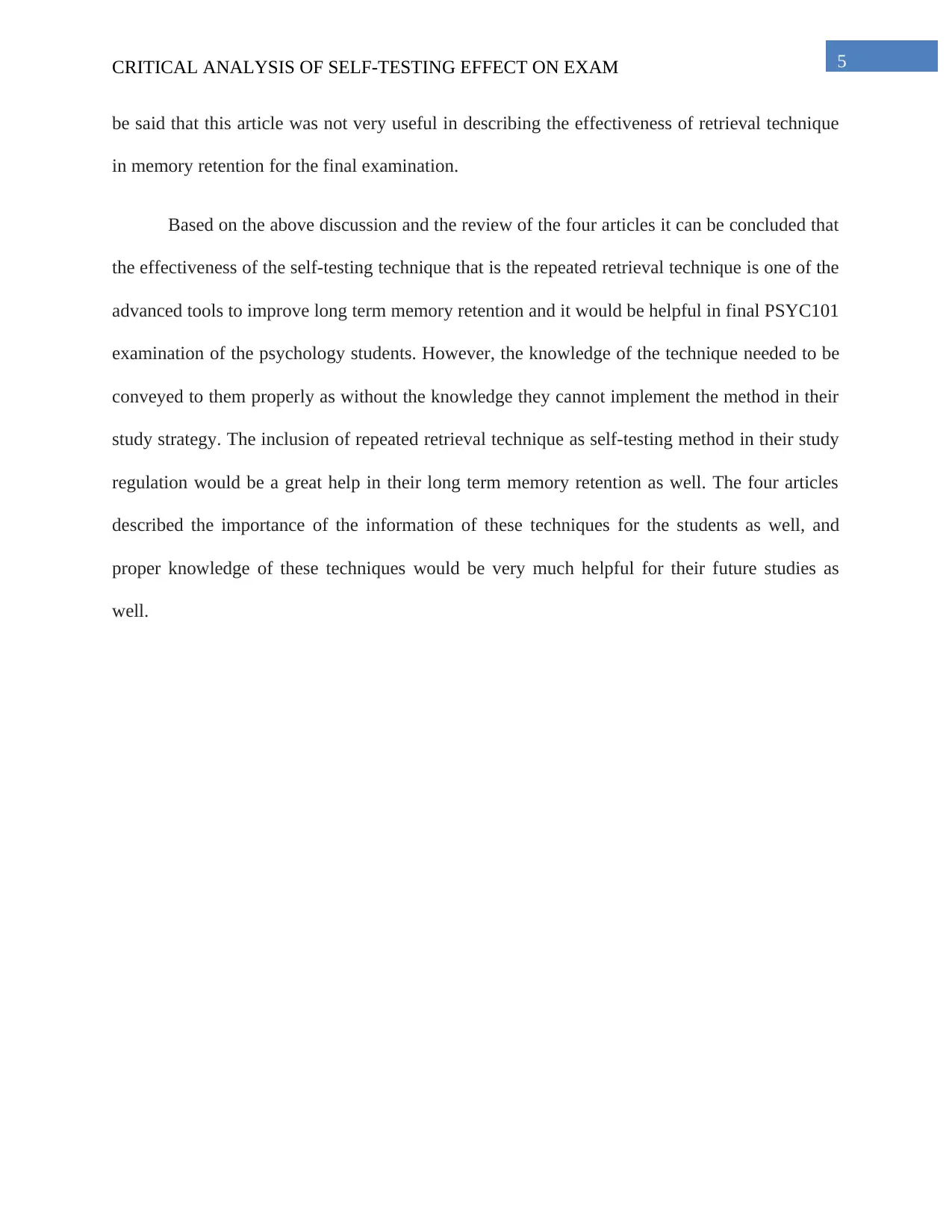
5CRITICAL ANALYSIS OF SELF-TESTING EFFECT ON EXAM
be said that this article was not very useful in describing the effectiveness of retrieval technique
in memory retention for the final examination.
Based on the above discussion and the review of the four articles it can be concluded that
the effectiveness of the self-testing technique that is the repeated retrieval technique is one of the
advanced tools to improve long term memory retention and it would be helpful in final PSYC101
examination of the psychology students. However, the knowledge of the technique needed to be
conveyed to them properly as without the knowledge they cannot implement the method in their
study strategy. The inclusion of repeated retrieval technique as self-testing method in their study
regulation would be a great help in their long term memory retention as well. The four articles
described the importance of the information of these techniques for the students as well, and
proper knowledge of these techniques would be very much helpful for their future studies as
well.
be said that this article was not very useful in describing the effectiveness of retrieval technique
in memory retention for the final examination.
Based on the above discussion and the review of the four articles it can be concluded that
the effectiveness of the self-testing technique that is the repeated retrieval technique is one of the
advanced tools to improve long term memory retention and it would be helpful in final PSYC101
examination of the psychology students. However, the knowledge of the technique needed to be
conveyed to them properly as without the knowledge they cannot implement the method in their
study strategy. The inclusion of repeated retrieval technique as self-testing method in their study
regulation would be a great help in their long term memory retention as well. The four articles
described the importance of the information of these techniques for the students as well, and
proper knowledge of these techniques would be very much helpful for their future studies as
well.
⊘ This is a preview!⊘
Do you want full access?
Subscribe today to unlock all pages.

Trusted by 1+ million students worldwide
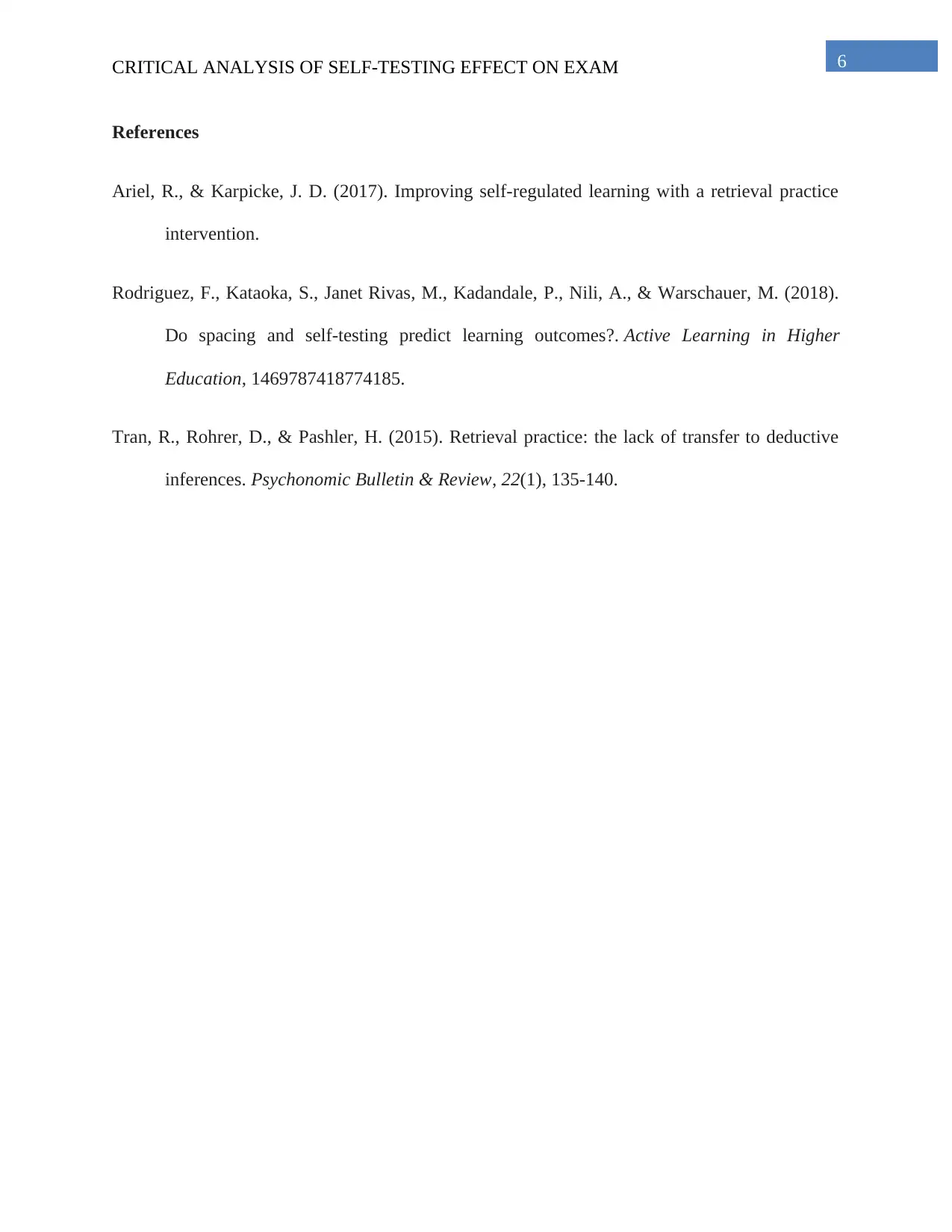
6CRITICAL ANALYSIS OF SELF-TESTING EFFECT ON EXAM
References
Ariel, R., & Karpicke, J. D. (2017). Improving self-regulated learning with a retrieval practice
intervention.
Rodriguez, F., Kataoka, S., Janet Rivas, M., Kadandale, P., Nili, A., & Warschauer, M. (2018).
Do spacing and self-testing predict learning outcomes?. Active Learning in Higher
Education, 1469787418774185.
Tran, R., Rohrer, D., & Pashler, H. (2015). Retrieval practice: the lack of transfer to deductive
inferences. Psychonomic Bulletin & Review, 22(1), 135-140.
References
Ariel, R., & Karpicke, J. D. (2017). Improving self-regulated learning with a retrieval practice
intervention.
Rodriguez, F., Kataoka, S., Janet Rivas, M., Kadandale, P., Nili, A., & Warschauer, M. (2018).
Do spacing and self-testing predict learning outcomes?. Active Learning in Higher
Education, 1469787418774185.
Tran, R., Rohrer, D., & Pashler, H. (2015). Retrieval practice: the lack of transfer to deductive
inferences. Psychonomic Bulletin & Review, 22(1), 135-140.
1 out of 7
Related Documents
Your All-in-One AI-Powered Toolkit for Academic Success.
+13062052269
info@desklib.com
Available 24*7 on WhatsApp / Email
![[object Object]](/_next/static/media/star-bottom.7253800d.svg)
Unlock your academic potential
Copyright © 2020–2025 A2Z Services. All Rights Reserved. Developed and managed by ZUCOL.





